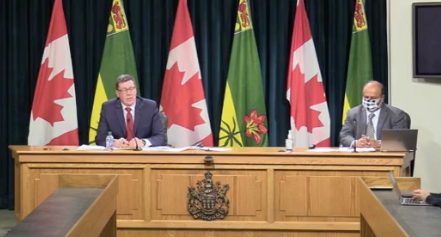
Chief medical health officer says recent case numbers are ‘very concerning’
Public health measures enacted in early December will remain in effect until Jan. 29, the province announced on Monday, due to the continued rise in COVID-19 cases.
That means private indoor gatherings will remain limited to household members only, and retail and personal service locations will continue to operate at reduced capacity. Places of worship and concert venues will remain limited to 30 people.
The current guidelines were set to end on Jan. 17. They will be reviewed again before Jan. 29.
Chief Medical Health Officer Dr. Saqib Shahab said those guidelines were reducing case numbers prior to the Christmas break. He’s confident they will work a second time–provided residents actually follow them.
“We have to recognize that unless all of us pull together, COVID comes back with a vengeance, and that’s what we are seeing right now,” Shahab told reporters. “Unless we can collectively return to our very cautious behaviours that allowed us to do so many things that we saw in mid-December, we will not be able to reverse this trend, and then, unfortunately, we would have to recommend certain measures that could be quite significant.”
Shahab said most businesses and households complied with public health measures over the holidays. He attributed the recent spike to a few bars and restaurants, which have been fined for not following the guidelines, and to households who exceeded the cap on private gatherings. Shahab said that’s responsible for cases popping up in workplaces and schools.
Saskatchewan’s active case count peaked at 4,763 cases on Dec. 7, before falling to 2,699 on Dec. 31. That number has since risen to 3,752 as of Tuesday. Shahab said their models showed a similar spike if just 10 per cent of residents didn’t follow public health guidelines over Christmas.
“The last four or five days have been very concerning,” he explained. “Three days with (at least) 300 (new cases), one day with (at least) 400, and (nearly) 250 today–250 is also very high, but compared to the last four days, you almost have a sense of relief.”
Shahab added that the COVID-19 vaccine likely won’t have a noticeable effect until the second quarter of 2021. He said health officials need to see a sustained downward trend in COVID case numbers before they’ll end the current public health measures. Until then, residents need to remain vigilant.
Premier Scott Moe said many people, including himself, are facing COVID fatigue, which may have contributed to some of the high case numbers coming out of the holidays. He urged Saskatchewan residents to follow public health orders for the benefit of the province’s youth and seniors.
When asked if even stricter measures are necessary to contain the spread, Moe said they would consider the option in their next review, but only as a last resort. Like Shahab, he’s confident the current measures will be enough.
“To further (increase) the restrictions and measures that we have in place today, which are significant, there’s consequences to that as well,” Moe said. “There are consequences to individuals in our communities across the province when it comes to mental health. There’s consequences to our youth, with their access to recreation opportunities.
“The measures that we have in place today have proven to push our numbers down (and) push them down quite substantially,” he added. “Yes, we’ve had a bump throughout January. We’ve talked publicly about the fact that we would likely have an increase in our numbers post-holiday season, and that’s exactly what we’re seeing here now. If those numbers continue over the course of the next two weeks, where they are or starting to increase then … I’m sure Dr. Shahab is going to come forward with a number of additional measures that will push those numbers down.”
Premier admits vaccination process started slow, but says process is on track
Premier Scott Moe admitted the province’s COVID-19 vaccine rollout could have gone better, but added he’s confident they’re on the right track.
As of Tuesday, healthcare workers have administered nearly 10,000 doses of the COVID-19 vaccine, including 824 doses in Prince Albert. Typically, the province can perform up to 80,000 flu vaccinations a week in a normal year, but the low-temperature storage and transportation requirements make the COVID-19 vaccine more difficult to administer.
Moe has faced criticism, especially in the north, over the province’s vaccine plan. On Tuesday, he said the rollout could have gone better.
“I don’t now that we could get to 80,000 a week with the COVID vaccine, but we most certainly would be able to deliver … the 190,000 vaccines that the federal government’s going to provide us in the first three months (of 2021),” he told reporters on Tuesday. “(It’s) a little bit of a sluggish start, admittedly.”
Moe said they choose to hold back some of the vaccine to give patients in a Regina pilot project a second dose. They also chose to send to vaccine to rural and remote communities instead of focusing on the cities. Moe said those two reasons, combined with the low-temperature requirements, were the biggest reason the program struggled to get off the ground.
The province expects to receive roughly 190,000 doses by the end of the first quarter, which is enough to fully vaccinate roughly eight per cent of the population. Moe said he’s confident they’ll administer them as quickly as possible when the time comes.

